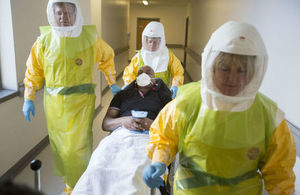UK team of health experts to tackle global disease outbreaks
New rapid support team will respond to urgent requests from countries around the world to help control disease outbreaks within 48 hours.

Medical personnel in protective clothing treating a patient
The UK Public Health Rapid Support Team, consisting of clinicians, scientists and academics, can be deployed to tackle outbreaks of disease anywhere in the world within 48 hours. They will be on call to respond to urgent requests from countries around the world and fly in to help tackle disease outbreaks at source.
The Ebola crisis highlighted the need for the international community to develop a system to help countries respond to and control disease outbreaks that pose a threat to public health before they can develop into a global emergency.
Public Health Minister Nicola Blackwood said:
Ebola shook the world and brave experts from the UK led the global response in Sierra Leone. The ability to deploy emergency support to investigate and respond to disease outbreaks within 48 hours will save lives, prevent further outbreaks and cement the UK’s position as a leader in global health security. Disease outbreaks can spread rapidly, including across borders. We know halting diseases at source is the most effective way to protect people in the UK.
The government has made £20 million available from the UK development assistance budget to fund the team over 5 years. It will be jointly run by Public Health England and the London School of Hygiene and Tropical Medicine, with the University of Oxford and King’s College London as academic partners.
The Chief Executive of Public Health England, Duncan Selbie, said:
Speed is key in tackling infectious disease, and with this new capability we can now deploy specialists anywhere in the world within 48 hours, saving and protecting lives where an outbreak starts and helping to keep the UK safe at home.
Director of the London School of Hygiene and Tropical Medicine, Professor Peter Piot, said:
We are proud that we will play a key role in protecting the UK from global epidemics. It is also vital that the UK helps strengthen vulnerable countries to detect and respond quickly to disease outbreaks. This means the world will be better prepared to prevent future epidemics, and we will not witness such suffering, death and social and economic disaster as we saw in the Ebola crisis.
When not responding to a disease outbreak, the team will research how best to deal with different types of outbreak. They will also train a group of public health reservists to make sure we’re able to scale up our response to any disease outbreak or health emergency.
The team will work with counterparts in developing countries to train local response teams to identify and control disease outbreaks. This would be in addition to preventing the spread of water-borne infections such as cholera.
The team includes experts in:
- tracking the progress of an outbreak (epidemiologists)
- diagnosing the cause of an outbreak (microbiologists)
- advising on outbreak control measures (infection prevention and control)
- community responses to outbreaks (social scientists)
- developing the best clinical response measures (clinical researchers)